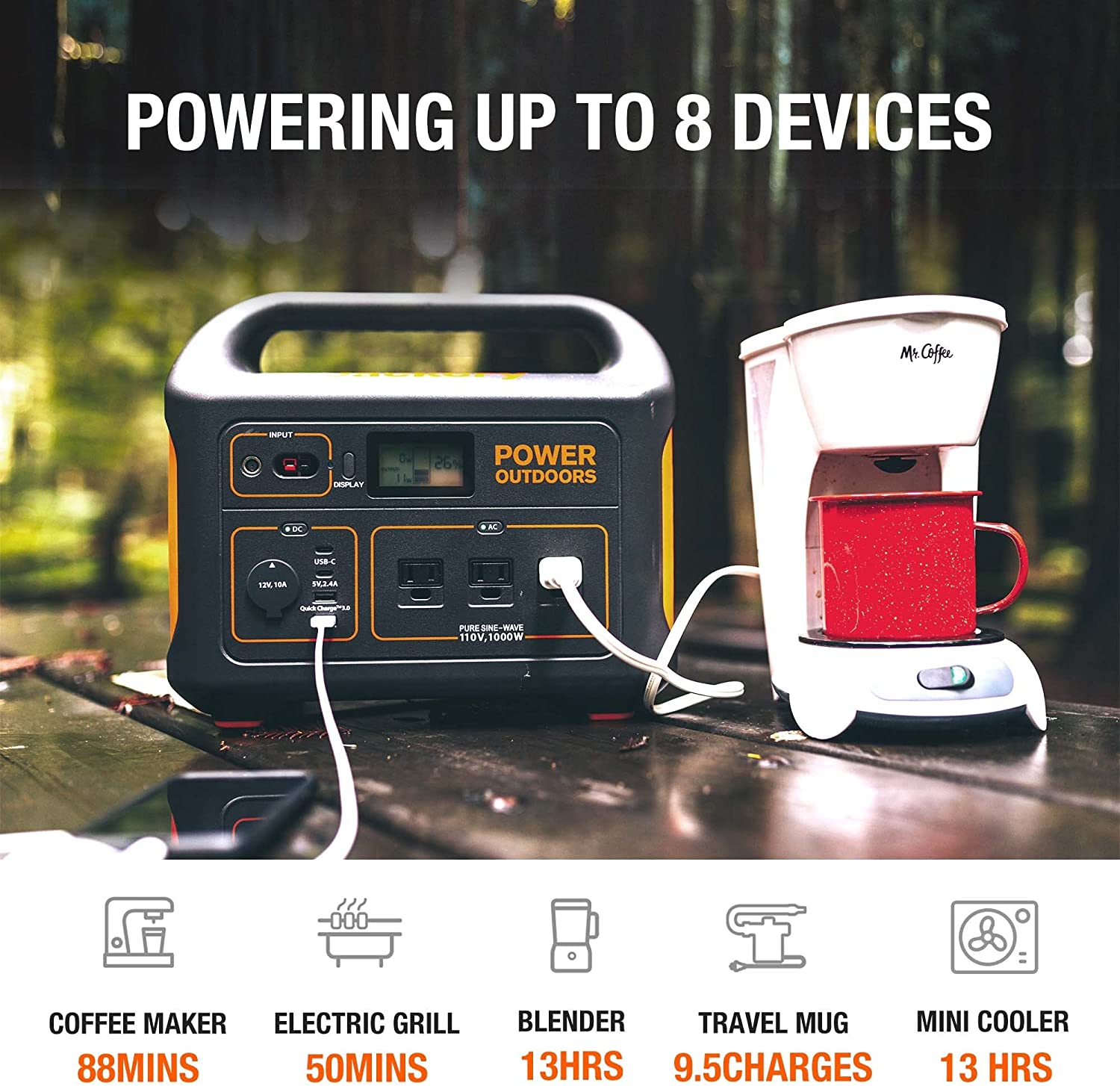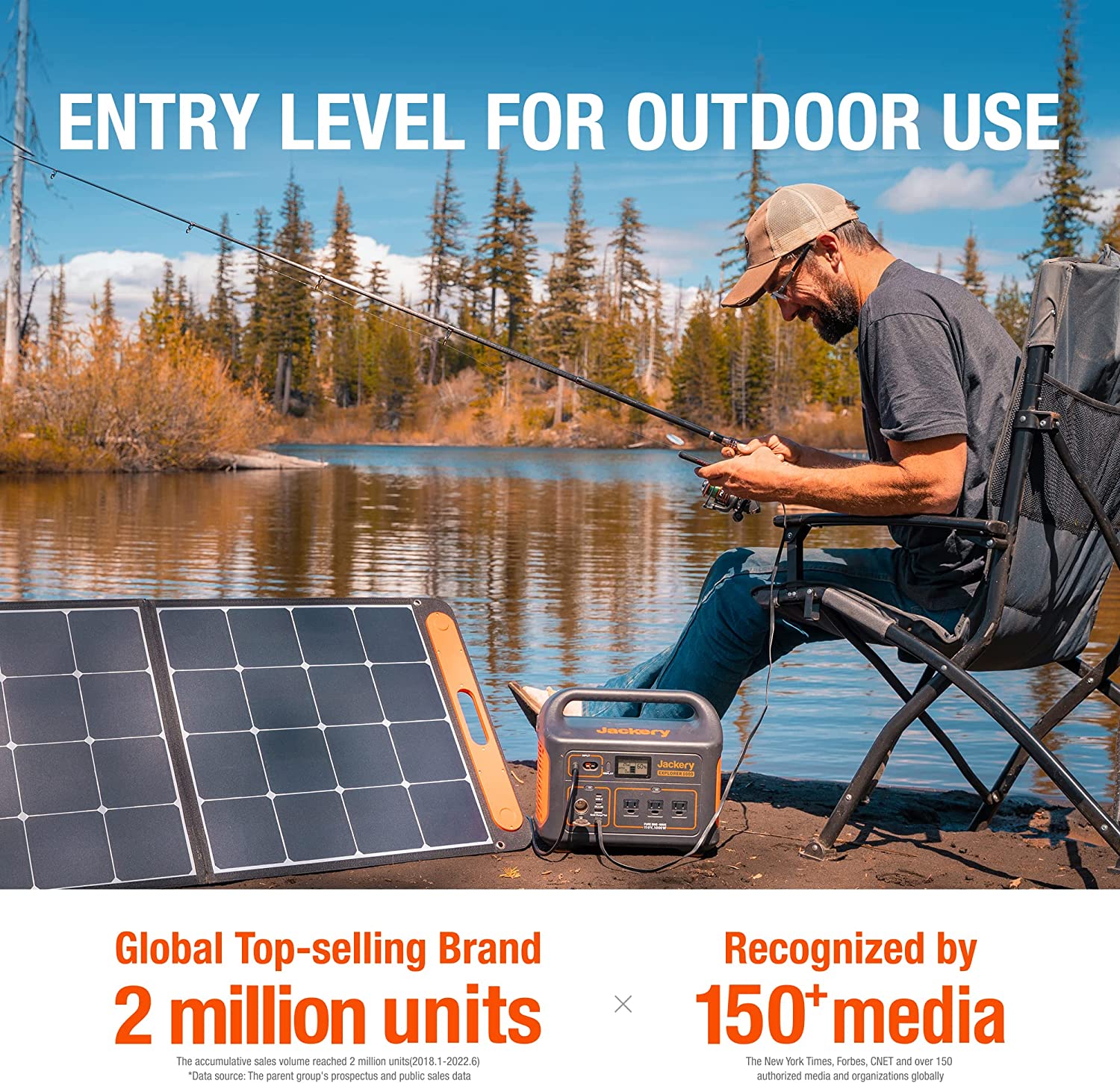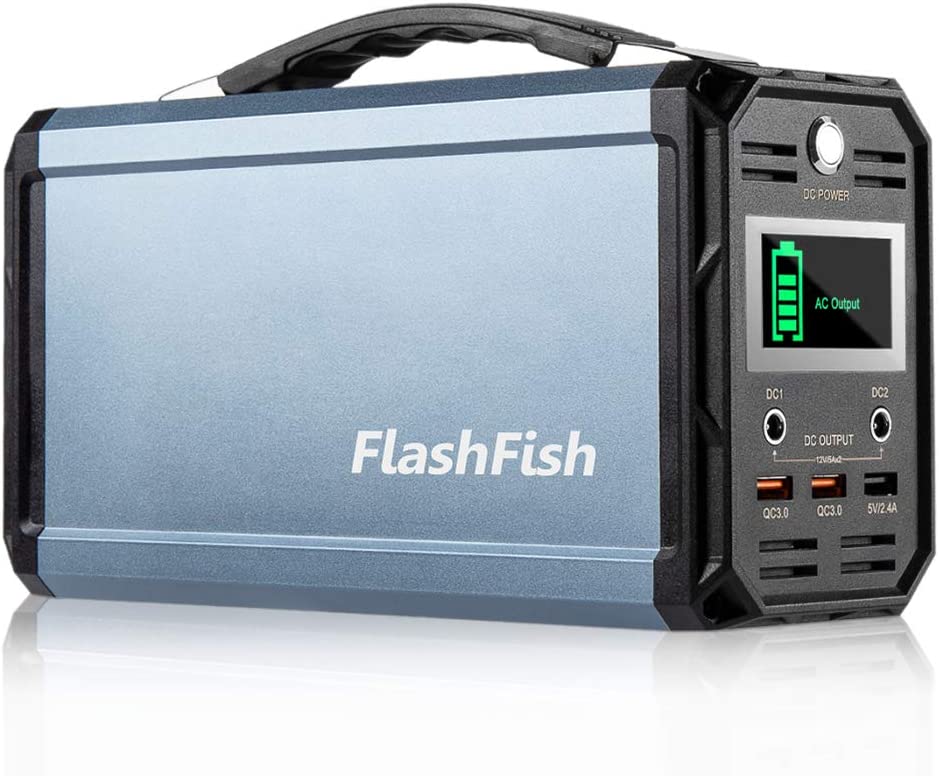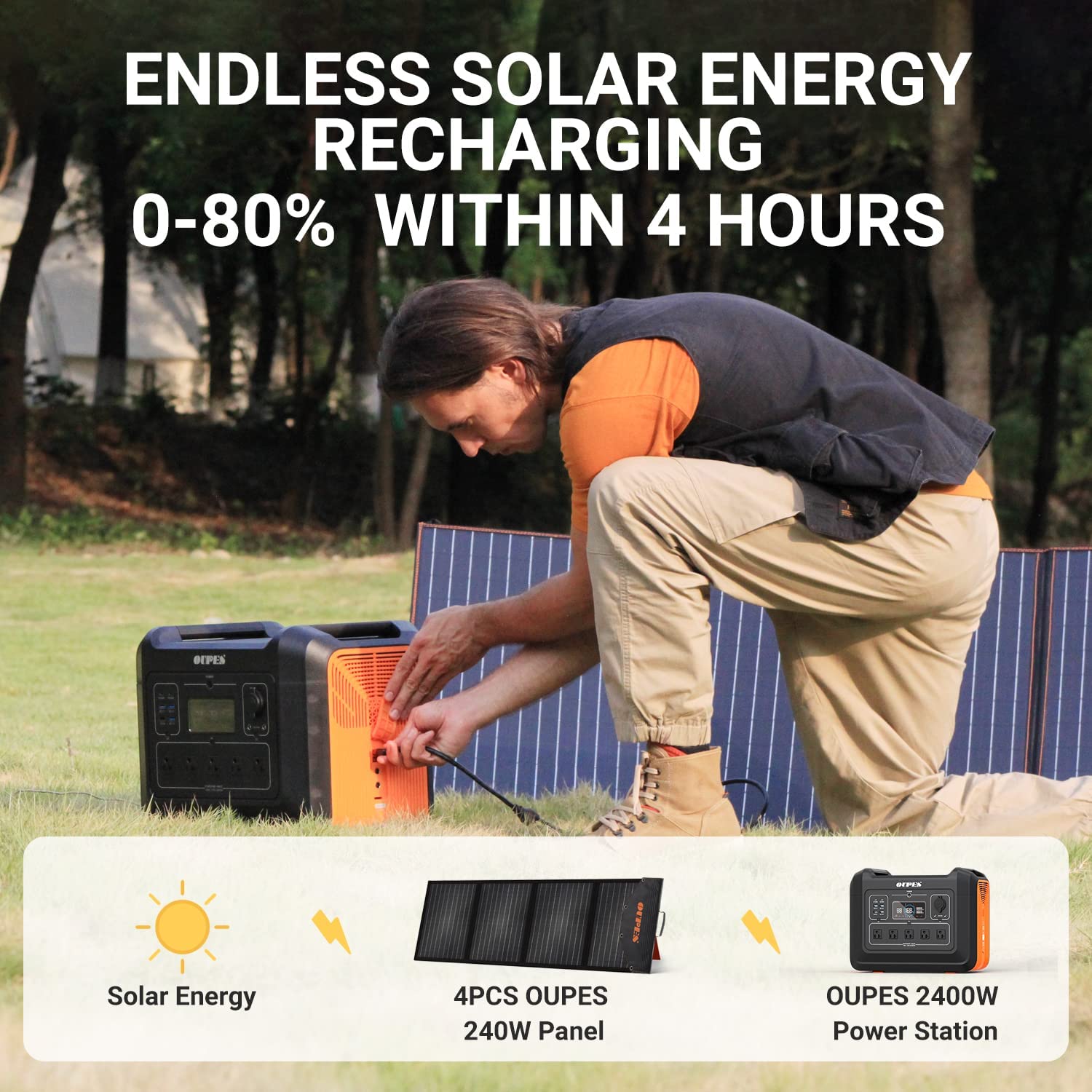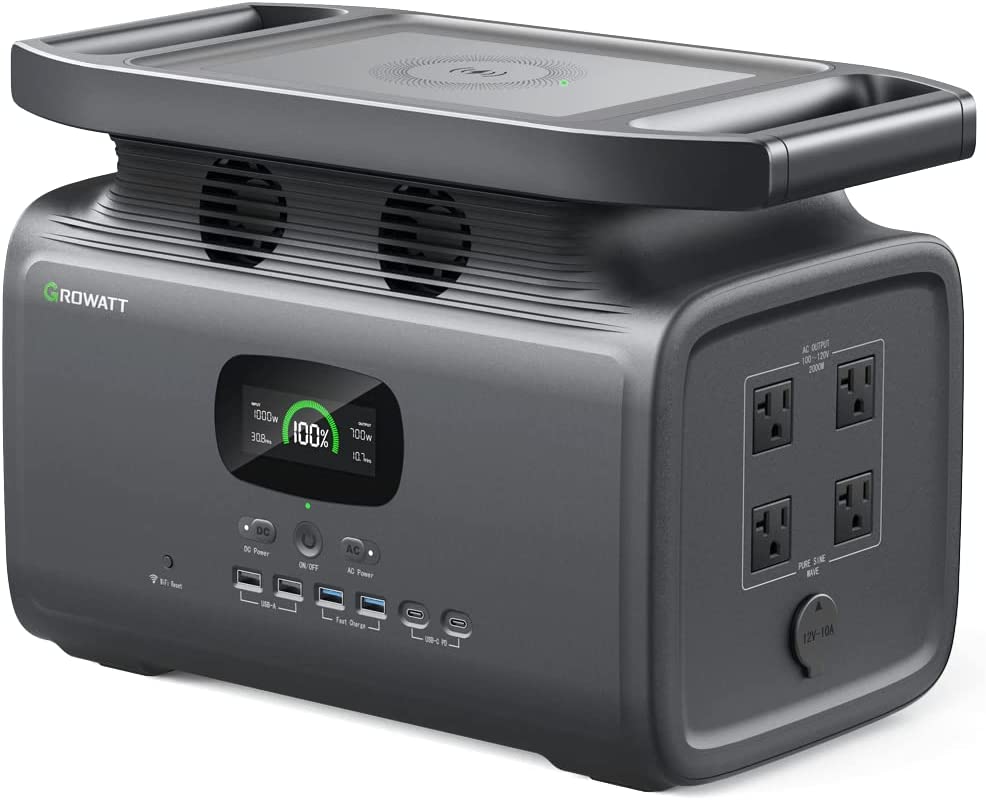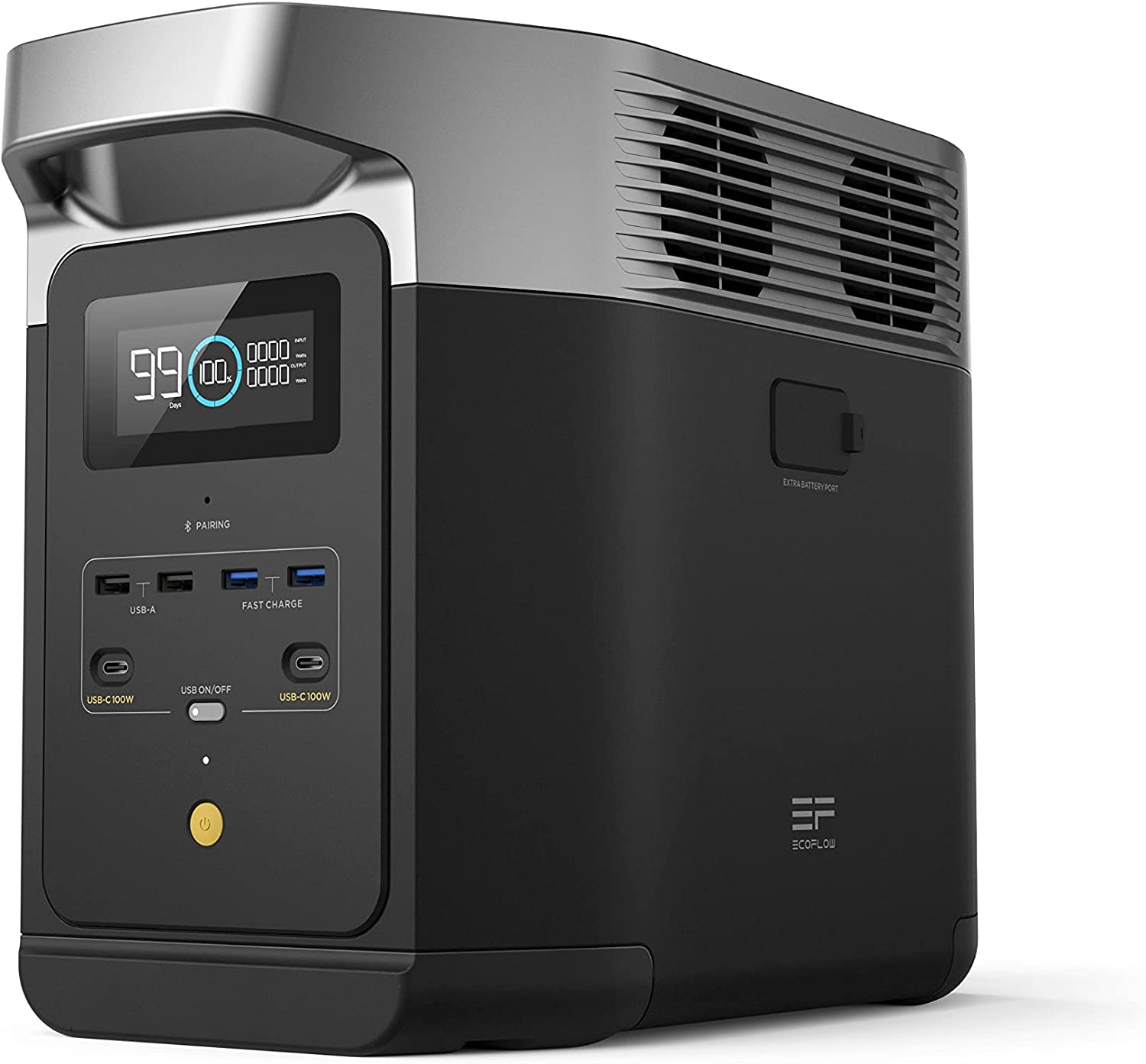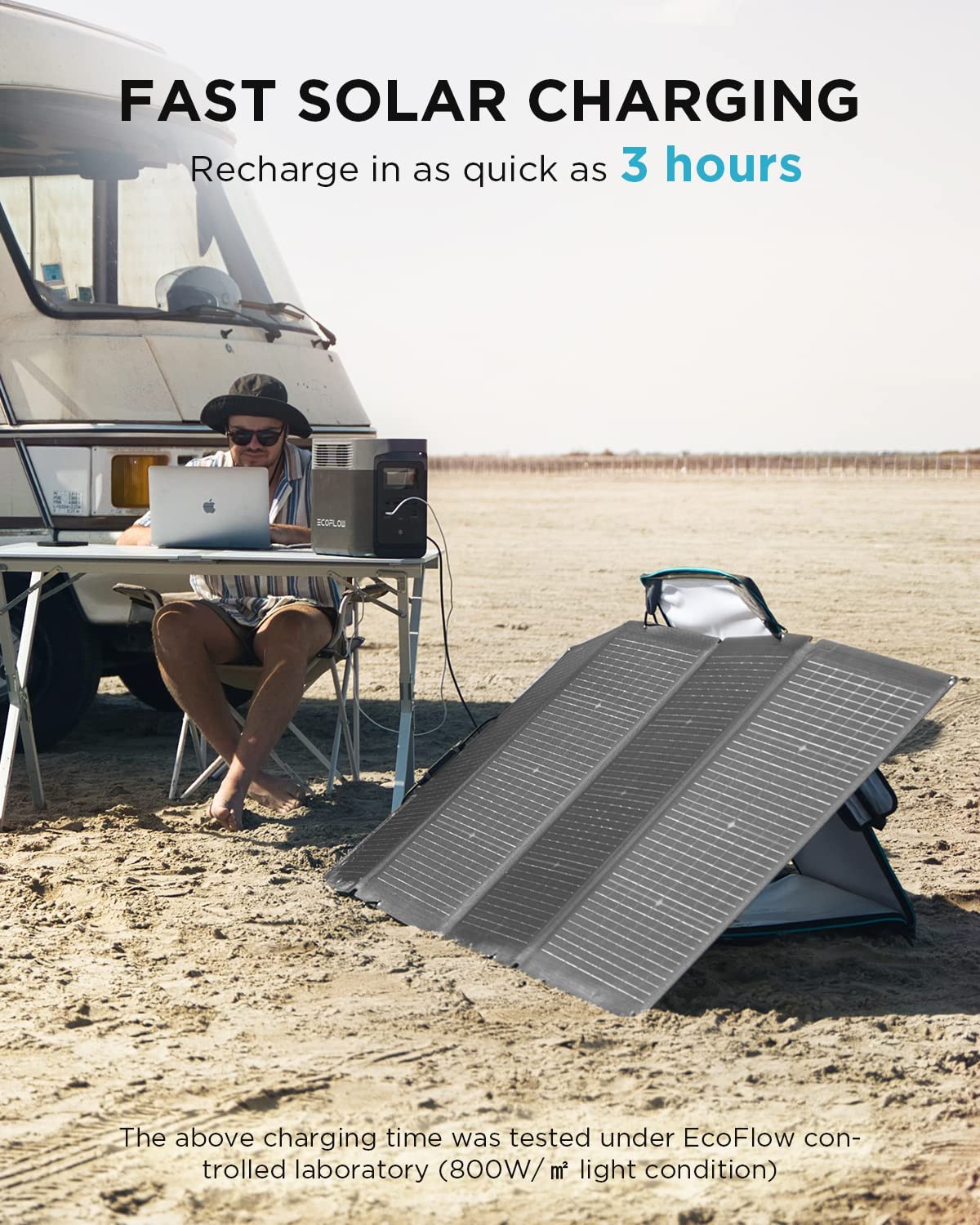Off-grid living may appear challenging for various reasons, with everyone being so used to the luxuries of urban living. But if there’s one major hurdle that stops people from switching to off-grid living, it’s electricity availability.
When living off-grid, you no longer enjoy access to 24/7 electricity at the push of a button. However, it would help if you still had electricity for basic cooking, heating, cooling, etc.
For such situations, a generator is your savior. But rather than being fuel-based, it’d be solar-powered due to its various advantages (discussed toward the end.)
But which solar generator is worth the money? What size solar generator should I buy?
Read on as I review the top solar generators for off-grid living (or camping) with a detailed buying guide.
Table Of Contents
- 1 5 Best Solar Generators For Off-Grid Living Summary:
- 2 What Size Generator Do I Need For Off-Grid Living?
- 3 What Factors To Know When Buying A Solar Generator For Off-Grid Living?
- 4 5 Best Solar Generator For Off-Grid Living – Detailed Review
- 5 Best Overall Solar Generator For Off-Grid Living
- 6 Best Budget Solar Generator For Off-Grid Living
- 7 Most Powerful Solar Generator For Off-Grid Living
- 8 Best Solar Generator For Refrigerators
- 9 Best Solar Generator For Camping
- 10 Is It Worth It To Buy A Solar Generator?
- 11 Best Solar Generator For Off-Grid Living FAQs
- 12 Conclusion
5 Best Solar Generators For Off-Grid Living Summary:
- Best overall: Jackery Explorer 1000
- Best Budget: FlashFish 60000mAh
- Most powerful: OUPES 2400W
- Best For Refrigerator: GROWATT Infinity 1500
- Best for Camping: EF ECOFLOW DELTA 2
What Size Generator Do I Need For Off-Grid Living?
To determine the size of the solar generator for off-grid living, you must calculate your average daily energy requirements in watts-hours. (Multiply the wattage of each essential appliance with the estimated hours it’ll run for.)
This will give you a rough estimate of your daily power requirements, which you can use to make an informed decision.
Consider this example:
You wish to run your refrigerator (150-300W), microwave (800-1200W), and space heater (1400-1500W) at once. So, the total wattage here is roughly 3000W.
While looking for a generator, it must have an inverter rated above 3,000W to power the above three appliances and more, as required.
Tip: Don’t purchase a solar generator with the exact power capacity you’d require. It’s better to have extra wattage for unforeseen circumstances or to run more devices.
Related: Best Solar Generator For Home Backup
What Factors To Know When Buying A Solar Generator For Off-Grid Living?
With so many solar generators to choose from, it’s not quite easy to pick the best machine that fulfills your requirements while living off-grid or RVing!
To help you out, here are some checkpoints to take care of.
-
Battery Capacity & Type
Like a “fuel” tank in a fuel-powered generator, the “battery” is the fuel tank in solar generators. It stores all the required solar energy to power your devices as and when required.
The more the battery capacity, the more stored energy, and the longer the running time of the generator.
Thus, go for the maximum battery capacity that fits your budget. Some examples are 1002Wh, 2325kWh, 4000kWh, etc. Note that such a battery will need longer charging sessions, say, 4 hours, 6 hours, 8 hours, etc.
Note: If the battery or generator can be charged by other means, for example, a wall socket or another generator, the better. This is because solar charging isn’t much quicker.
About the battery type, most generators have the standard lithium battery as it’s safer to use. Other types include flow batteries, nickel-cadmium batteries, etc.
Related: Best Whole House Generator – 5 top Picks For All House Sizes
-
Solar Charge Controller
During the charging of the power station, instances of overcharging are common. This is not good for the generator’s battery which can lose its charging capacity or explode.
To prevent such a scenario, ensure your generator has a built-in solar charge controller, especially MPPT (Maximum Power Point Tracking).
The function of such a device is simple. It monitors the current flow and avoids overcharging the battery. Thus, your solar generator won’t draw in more current if fully charged.
Note: If a solar charge controller is in place, you can leave your generator on charging overnight.
Related: What Size Generator For 30 Amp RV – 3 Top Models
-
Generator Charging Options
The generator will charge your devices. But how will you charge your generator in the first place?
Sunlight will be your first preference here, but it shouldn’t be the only one.
And here’s why:
You can’t expect clear weather conditions at all times, and cloudy skies or rainfall are inevitable. A DC or AC input on the generator is a blessing to handle these.
-
Variety & Number Of Outlets
The variety and number of output ports are the next important aspect of any solar generator that influences its versatility.
While not-so-latest models usually house 110V AC and 120V DC output ports, the latest generators have a few USB Type A and C ports to charge USB-compatible devices, such as smartphones, laptops, tablets, and more.
Note: The more output ports, the more simultaneous connections are possible. However, the price of the generator will also escalate in this case.
-
Ease Of Portability
Most solar generators available online (discussed in this piece) are suitable for off-grid living and camping, trekking, etc. Thus, you’d be required to carry the generator from one point to another.
This is where portability comes into the picture.
If your chosen generator is bulky, its transportation would be daunting, and vice-versa.
As a thumb rule, the weight of a solar generator depends on that of the battery inside. The heavier the battery, the heavier the whole unit.
Tip: Select a solar generator according to your purpose instead of the highest battery capacity to avoid owning a heavy unit.
Related: Learn How To Hook Up A Generator To Your House
5 Best Solar Generator For Off-Grid Living – Detailed Review
Here are the five best solar-powered portable generators to keep your refrigerator, laptop, smartphone, heater, and electrical device up.
Best Overall Solar Generator For Off-Grid Living
Jackery Explorer 1000 Portable Power Station
Specifications
- Capacity: 1002Wh
- Outlets: 2 USB-C, 2 USB-A, 1 DC car port, and 3 pure sine wave (AC)
- Dimensions: 13.1″ x 9.2″ x 11.1″
- Charging Options: Solar panels, wall socket, vehicle’s 12V outlet, electric generator
If you’re looking for a high-capacity portable solar generator with advanced loadings, you can’t miss the Explorer 1000 from Jackery.
With a total 1002Wh capacity, you get an amazing 2000W surge and 1000W continuous power to charge your electrical equipment, including a power-hungry refrigerator.
As for the connections, there are eight fast-charging outlets – 2 USB-C, 2 USB, 1 DC car port, and 3 pure sine wave (AC.) Hence, you can connect multiple devices simultaneously when this powerful power station is fully charged.
And you need not wait for too long to get Jackery Explorer 1000 fully charged. Thanks to the built-in MPPT charge controller, the unit charges up within 8 hours under direct sunlight. All you need is to connect two SolarSaga 100W solar panels. Note that these are sold separately.
Note: Besides sunlight, you can use any compatible wall socket, your vehicle’s 12V outlet, or a generator to charge Explorer 1000.
You can easily carry the power station for off-grid living or RV camping due to its lightweight (22lbs) design and robust carry handle. Not to forget the large LCD screen that displays the status of the charge, battery left, etc., for ease of use.
Pros
- Versatile power station for indoor & outdoor use
- Ideal for big appliances, such as refrigerators
- Fast charging with massive power backup
Cons
- LCD screen often fluctuates
Check the Jakery Explorer 1000’s latest prices on Amazon
Best Budget Solar Generator For Off-Grid Living
FlashFish 60000mAh Portable Power Station Camping Portable Generator
Specifications
- Capacity: 60000mAh
- Outlets: 110V AC, 12V DC, QC3.0 USB, and 2.4A USB ports
- Dimensions: 9.76″ x 3.38″ x 5.94″
- Charging Options: Solar panels, wall socket, and vehicle’s 12V outlet
Are you on a tight budget and can’t spend much on solar generators? If that’s the case, this FlashFish 222Wh/60000mAh capacity power station is for you. You can own it for less than $200!
But don’t underestimate its capabilities due to the price tag. Suitable for off-grid living and outdoor activities, such as camping, trekking, hiking, and backpacking, the FlashFish power station provides you with 300W continuous and 350W surge power.
This much power is enough to keep your devices like laptops, smartphones, tablets, and drones running in the middle of the wilderness. You can use the 110V AC, 12V DC, QC3.0 USB, and 2.4A USB ports to connect all these to the solar generator.
Coming to the construction, the power station comprises a silver metal casing and plastic ends for better portability and durability. Weighing just 5.6lbs, it easily fits in your backpack! Isn’t it amazing?
Some notable safety features include low/high voltage protection, short-circuit protection, overheat protection, over-current protection, and lock-on protection. Hence, the unit is entirely safe to use.
To charge the solar generator, you can connect it to the standard solar panels, any wall socket, or your vehicle’s 12V outlet.
Pros
- Extremely lightweight and portable
- Multiple charging options
- Various built-in safety features
Cons
- Not much power capacity
Check the FlashFish 222Wh/60000mAh’s latest prices on Amazon
Most Powerful Solar Generator For Off-Grid Living
OUPES 2400W Power Station with 480W Solar Panels
Specifications
- Capacity: 2232Wh
- Outlets: USB-A ports, USB-C ports, car charging ports, etc.
- Dimensions: 16.5″ x 10.6″ x 12.3″
- Charging Options: Solar panels
If the solar generator’s capacity is your focal point, I don’t think this OUPES 2400W Power Station’s 2232Wh capacity will appear mediocre to you.
It is the most potent power station you’ll come across (at least on this list), with 2232Wh capacity. It provides an uninterrupted supply of “green” energy to fulfill your power needs while living off-grid.
Designed for noiseless operation, you can even purchase it for indoor purposes.
The company recommends 960W/480W solar panels to charge the power station. While four panels each of 240W can set the machine in 4 hours, the charging time doubles to 8 hours with only 2 240W solar panels at work. You can’t use any other means to charge the generator.
The continuous and peak power outputs are 2400W and 5000W, respectively. No power-related worries anymore!
In terms of output ports, there are 14 versatile outlets for all essentials. These include USB-A ports, USB-C ports, car charging ports, and more. There’s also a bright LCD screen that displays the charging status, charge left, etc.
Although a costly affair, OUPES 2400W Power Station is worth the deal.
Pros
- Wide LCD screen that displays all the required information
- Noiseless operation
- Decent continuous and peak power output
Cons
- No charging options except the solar panels
Check the OUPES 2400W Power Station’s latest prices on Amazon
Best Solar Generator For Refrigerators
GROWATT Infinity 1500 Portable Power Station
Specifications
- Capacity: 1512Wh
- Outlets: USB-C, USB-A, 12V car outlet, etc.
- Dimensions: 16.5″ x 9.1″ x 11.3″
- Charging Options: Solar panels and AC charger
What if I told you that this GROWATT Infinity 1500 Power Station charges from 0-80% in 1 hour and simultaneously powers up to 12 devices?
With a maximum capacity of 1512Wh, GROWATT solar-based power station provides you with 2000W continuous and 4000W surge power. Thus, you can charge up to 12 devices of any wattage.
In case of any charging issues, the built-in Uninterruptable Power Supply system comes into play to ensure no device is cut off. Besides, a battery management system looks after the battery’s health and checks for overheating.
You can use any AC charger to charge the power station within 1-1.6 hours. If you use direct sunlight, a single 800W solar panel will take approximately 2.5 hours to charge.
Besides on-device buttons, you can install the official MyGro app for streamlined power station management. Through this app, you can turn the charging ports on/off and remotely monitor the charging status, battery lifespan, and more.
As for the power output ports, you get the standard USB-A ports, USB-C ports, 12V car outlet, etc. There’s a wireless charging pad at the top of the unit as well.
Pros
- Wireless charging pad
- Online app to monitor the power station remotely
- Fantastic charging speed and output capacity
Cons
- Build quality could have been better
Check the GROWATT Infinity 1500’s latest prices on Amazon
Best Solar Generator For Camping
EF ECOFLOW DELTA 2 Portable Power Station
Specifications
- Capacity: 1024Wh
- Outlets: USB-C, USB-A, USB-A Fast Charge
- Dimensions: 15.7″ x 11.1″ x 8.3″
- Charging Options: Solar panels and AC wall socket
Lastly, let’s discuss the 2-in-1 EF ECOFLOW DELTA 2 Portable Power Station. I said, “2-in-1” because the machine runs on both batteries and solar power. Thus, spare batteries can be used if you can’t use sunlight to charge the power station due to cloudy conditions.
Moreover, the power capacity is impressive at 1024Wh and can be expanded by 1-3kWh. You need to add more batteries for the same.
Coming to the output ports, there are a total of 15 outlets, including quick charging (QC) USB-A, USB-C, etc. Hence, nearly 90% of electrical appliances can be powered simultaneously—for example, smartphones, laptops, etc.
I recommend using 500W solar panels (over the AC wall socket) to charge your power station to achieve 7x faster charging or 0-80% in just 50 minutes.
In terms of safety, there’s a built-in BMS to monitor the battery life and health. For example, if the battery is overheating or undercharging, you’ll be notified of the same.
To get the best out of your power station, I don’t recommend using it while charging as it reduces the charging speed and battery life.
Note: You can turn on X-Boost to power your electrical devices up to 2200W.
Pros
- Suitable for power-hungry devices
- Portable design with LCD screen
- Battery life worth 3000 cycles
Cons
- Fast charging doesn’t work sometimes
Check the EF ECOFLOW DELTA 2’s latest prices on Amazon
Is It Worth It To Buy A Solar Generator?
Yes, a solar generator is worth buying over any fuel-based one. Here’s why.
-
Quiet Operation
Let’s be honest. No one likes those annoying noises of fuel-powered generators that often exceed the safe levels for human ears.
But that’s not the case with solar generators, as they don’t produce any noise. How? This is because of no moving parts in solar generators.
-
Easy To Use
Due to no moving parts, rest assured nothing is going wrong with your solar generator that would call for professional assistance.
-
Environment-Friendly
Regular generators release toxic carbon monoxide (CO) gas into the atmosphere, which can also prove fatal. However, there’s no such issue with solar generators as they don’t use any fuel except sunlight.
-
Suitable For Indoor Use
You can’t install and use fuel-powered generators indoors as they release harmful fumes into the atmosphere. However, solar ones can be used indoors as they utilize built-in batteries, ensuring no emissions.
Besides, several other benefits of solar generators vary from model to model.
Best Solar Generator For Off-Grid Living FAQs
- Can I Leave My Solar Generator Plugged In All The Time?
Ans: Yes, you can leave your solar generator plugged in all the time.
-
How Many Years Will A Jackery 1000 Last?
Ans: A Jackery 1000 will probably last 2-3 years as it contains lithium batteries designed for 500 complete charge cycles.
-
How Long Will A Solar Generator Stay Charged?
Ans: How long a solar generator stays charged depends on three main factors.
- Generator’s maximum capacity
- Number of devices connected
- Electricity usage of each connected device
The more the generator’s capacity, the more connections possible; thus, the shorter the charge.
-
Can I Use My Solar Generator While Charging It?
Ans: Yes, you can use your solar generator while charging it, provided there’s sufficient charge to charge the required device(s). However, this will slow the charging speed as energy will keep running out.
-
Do Solar Generators Work On Cloudy Days?
Ans: Yes, solar generators work on cloudy days, as solar panels still work even if the light is reflected or partially blocked by clouds.
-
Which Is Better, Anker Or Jackery?
Ans: If you’re concerned by the power capacity of Anker and Jackery (which you should be), Jackery emerges as the clear winner for being more powerful than Anker.
Conclusion
So, there you go. That’s everything you must know about solar generators. From their ideal size to crucial features, I’ve discussed them all. To help you choose one for your off-grid living, I’ve also reviewed my top five solar-powered generators with best-in-class components.
You can rely on any of the above models to have a fantastic off-grid living experience with all your gadgets charged up as and when you need them.



